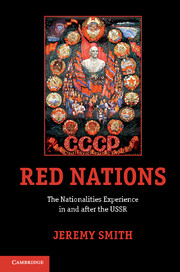Book contents
- Frontmatter
- Dedication
- Contents
- Tables
- Preface
- 1 Introduction: the prison-house of nations
- 2 Dispersal and reunion: revolution and civil war in the borderlands
- 3 Bolshevik nationality policies and the formation of the USSR: the Bolsheviks dispute national policy
- 4 Nation-building the Soviet way
- 5 Surviving the Stalinist onslaught, 1928–1941
- 6 The Great Patriotic War and after
- 7 Deportations
- 8 Territorial expansion and the Baltic exception
- 9 Destalinisation and the revival of the republics
- 10 Stability and national development: the Brezhnev years, 1964–1982
- 11 From reform to dissolution, 1982–1991
- 12 Nation-making in the post-Soviet states
- 13 The orphans of the Soviet Union: Chechnya, Nagorno Karabakh, Abkhazia, South Ossetia and Transdniester
- Conclusion
- Bibliography
- Index
- References
6 - The Great Patriotic War and after
Published online by Cambridge University Press: 05 June 2014
- Frontmatter
- Dedication
- Contents
- Tables
- Preface
- 1 Introduction: the prison-house of nations
- 2 Dispersal and reunion: revolution and civil war in the borderlands
- 3 Bolshevik nationality policies and the formation of the USSR: the Bolsheviks dispute national policy
- 4 Nation-building the Soviet way
- 5 Surviving the Stalinist onslaught, 1928–1941
- 6 The Great Patriotic War and after
- 7 Deportations
- 8 Territorial expansion and the Baltic exception
- 9 Destalinisation and the revival of the republics
- 10 Stability and national development: the Brezhnev years, 1964–1982
- 11 From reform to dissolution, 1982–1991
- 12 Nation-making in the post-Soviet states
- 13 The orphans of the Soviet Union: Chechnya, Nagorno Karabakh, Abkhazia, South Ossetia and Transdniester
- Conclusion
- Bibliography
- Index
- References
Summary
The Soviet Union’s eventual victory in the Great Patriotic War of 1941–1945 came at the expense of suffering and loss of life on an unimaginable scale. Compared to combined US and British losses of well under a million people overall, the Soviet Union lost, according to latest estimates, between 25 and 30 million lives, the majority of those civilian. While no breakdown of casualties by nationality exists, Russians made up the bulk of the Red Army and no doubt figured heavily among the military losses. For non-Russians, nevertheless, a number of aspects of the wartime experience suggest that in many cases national suffering was higher than for the Russians. This was most obviously the case for those peoples – Germans, Tatars from Crimea, Balkars, Chechens, Cherkess, Ingush, Kalmyks, and Karachais from the North Caucasus, and Meskhetians from the South Caucasus – who suffered wholesale deportations from their territories and relocation in special settlements, as will be discussed in Chapter 7. The first front of the Great Patriotic War was in Belorussia and Ukraine, whose population suffered not only the ravages of invasion but a ruthless occupation. Although some German leaders advocated turning the Belorussians and Ukrainians against the Russians, the pull of Nazi racial ideology proved too strong, and all Slavs were treated as Untermenschen. Further to the north, the Estonians, Latvians and Lithuanians were subjected to occupation first by the Soviets in 1939–1941, next by the Nazis and then again by a vengeful Soviet Union. And in all of the occupied territories, the Jewish population was wiped out under the Final Solution, which the Nazis arrived at six months after the invasion of the USSR, and which may have been implemented first in Lithuania.
- Type
- Chapter
- Information
- Red NationsThe Nationalities Experience in and after the USSR, pp. 122 - 146Publisher: Cambridge University PressPrint publication year: 2013



